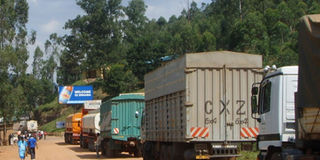URA to track goods electronically

Cargo trucks in transit to Rwanda. With the new system in place, goods will be tracked from the point of entry to their destination. FILE PHOTO
What you need to know:
System to help owners monitor their goods.
Kampala- Uganda Revenue Authority (URA) will this Friday start the use of a new electronic tracking system that monitors goods imported to or transiting through Uganda from Mombasa port.
The Electronic Cargo Tracking System (ECTS) device, it is said, will enable the importers get knowledge about the transiting of their goods, reduce on the transit time and also reduce the cost of doing business.
According to Uganda Revenue Authority’s Commissioner Customs, Mr Richard Kamajugo, the system will see importers save up to $1.179 million (about Shs3 billion) per year.
The system has an interface that enables cargo owners and agents know the status of their cargo and Rapid Response Teams (RRTs) deployed along the transit routes to respond to any alert from the system.
The project, worth $5.2m (Shs13.1billion), is supported by World Bank, Trademark East Africa and the Uganda government.
Prior to this project, URA has been deploying escorts for some of the goods from Mombasa, making the process costly.
The ECTS system will set off with a list of products including; motor vehicles imported by individuals, spirits, beer and beverages, sugar, rice, cigarettes, wines and textiles, tyres, used clothes and shoes.
“These were the most risky goods, the ones most likely to be dumped in the country when destined for export,” Mr Kamajugo said.
Mr Kamajugo added: “The tracking is free of charge and upon request by clients. Importers may be granted rights to individually monitor their goods while in transit.”
Commenting about the system, Kampala City Traders Association (Kacita) Chairman Everesto Kayondo said the project will tackle the disappearance of goods. “Many times our goods have been disappearing between Mombasa and Kampala, the introduction of this ECTS has been long overdue. It will reduce on the dumping,” Mr Kayondo said.




